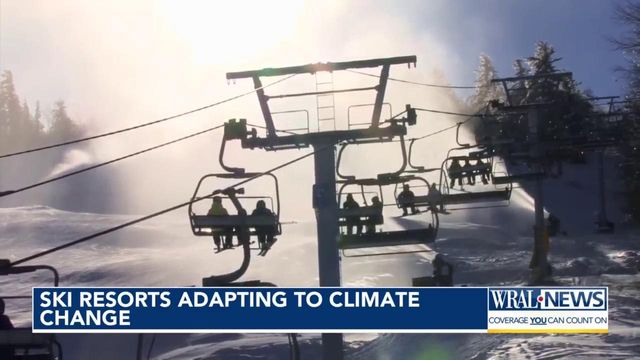How ski resorts are adapting to climate change
In much of the Southeast, ski seasons are starting later and natural snow is getting harder to come by. But ski resorts are utilizing advanced snowmaking technology to keep the mountains white and skiiers on the slopes.
Jess Dobson traveled from Raleigh to Snowshoe Resort in West Virginia after a storm dumped coveted fresh powder ahead of the busy President's Day weekend.
"I feel like the season starts a little bit later every year and it’s a lot of artificial snow," Dobson said.
According to data analyzed by Climate Central, snowfall decreased across most of the U.S. between 1970-2019. Winter is the fastest warming season for most of the country and the number of days with temperatures below 32°F is expected to continue to decline over the coming decades.

"Natural snow is just icing on the cake for us, so we approach it as if we’re not going to have it all," said Shawn Cassell, marketing director for Snowshoe. "We’ve got to make the snow."
Snowshoe has invested more than $5 million in recent years to upgrade snowmaking technology at the resort to more efficient, high-volume cannons.
"We used to get about six or seven days in a row of weather cold enough to make snow, now it seems like it's just two or three until you get a warm up," Cassell said. "So we really have to weatherproof ourselves for those upswings and now we’re making more snow in those tighter windows than we ever had before."
Snowshoe operators quantified the snowmaking capabilities of the resort: If every gun was pointed at a football field, they'd be able to make 27 feet of snow in 12 hours.
Kaitlyn Trudeau, a researcher with Climate Central, analyzed data from 2041 weather stations across the U.S. to see how annual snowfall has changed over the past five decades. Of the 31 stations analyzed in North Carolina, 90% of stations are seeing less snow now compared to the early 1970s.
"The snow season is starting later - if at all, in some places - and overall the snow season length is decreasing," Trudeau said.
Beech Mountain resort in Western North Carolina has installed new snow blowers in recent years to compensate for more unpredictable winter conditions, including an all-weather system on its tubing runs.
"It has an enclosed space that can produce snow inside [of the machine] and it's able to make snow upwards of 60 degrees, so that's been a real game changer for us," said Talia Freeman, a marketing director at Beech Mountain in North Carolina. "They call it fake snow, but it's still real snow. It's just made with a machine and humans instead of Mother Nature."
Resorts across the East have also been promoting off-season activities, such as ziplining and mountain biking, to draw tourists year-round.
"Mountain biking has become for summer what skiing has for us for the winter," Cassell said. "We're trying to become less heavily dependent on winter as a business."











